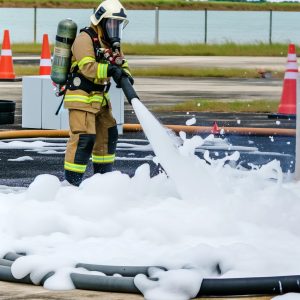In this article, I am going to address the Texas Firefighter Foam Cancer Lawsuits, the cause, the types of cancer illnesses associated with firefighting foam, and the current state of the litigation.

Texas Firefighter Foam Cancer Lawsuits. Fire fighting foam linked to deadly Cancers. Call Dr. Shezad Malik at 214-390-3189.
If you are seriously injured or have life-threatening cancer and you are affected by the Texas firefighter foam lawsuit, understanding your legal rights is crucial. This important injury matter centers on allegations that Aqueous Film Forming Foam, AFFF has caused catastrophic health problems for Texas firefighters.
If you or a loved one has been adversely affected by firefighting foam, the Dr. Shezad Malik law firm is here to provide support and fight for your rights.
Texas Firefighting Foam Cancer Lawsuits
There has been an increase in the number of firefighting foam cancer lawsuits over the past few years. These lawsuits have focused on AFFF firefighting foam, a dangerous chemical substance widely used by firefighters to extinguish flammable liquid fires, on a daily basis.
PFAS are known as “forever chemicals” because of their persistence in the environment, the drinking water, and the human body has led to fears about their potential health impacts.
Take home message from the Firefighting Foam Cancer Lawsuits
These lawsuits have demonstrated the connection between PFAS chemicals in firefighting foam and cancer. The presence of these toxic, chemicals in firefighting foam has been linked to environmental contamination and various types of cancer.
The dangers associated with AFFF is from environmental and health impacts due to the presence of PFAS. PFAS are a group of man-made chemicals that have been used in a variety of industrial and consumer products for their water-repellent, grease-repellent, and non-stick properties.
The challenge with PFAS is their “forever chemicals” nickname, which underscores their resistance to degradation, they do not break down in the environment and can accumulate in human and animal bodies over time.
Once PFAS contaminate a water source, they can remain there for a long time, posing risks to human health and the environment. Traditional water treatment processes are often inadequate for removing PFAS, requiring communities to invest in advanced treatment technologies, such as activated carbon filtration or reverse osmosis, to ensure safe drinking water.
Who are the Manufacturer Defendants in Texas AFFF Lawsuits?
Firefighting Foam and Cancer Link
The health issues associated with AFFF primarily stem from its content of per- and polyfluoroalkyl substances PFAS, which are persistent in the environment and can accumulate in the human body over time.
Cancer: There is evidence suggesting that exposure to PFAS can increase the risk of certain types of cancer, particularly testicular and kidney cancer. The International Agency for Research on Cancer (IARC) has classified PFOA, one of the PFAS chemicals, as “possibly carcinogenic to humans.”
Contact with firefighting foam PFAS can lead to various types of cancer, including:
- Kidney cancer
- Testicular cancer
- Prostate cancer
- Breast cancer
- Liver cancer
- Pancreatic cancer
- Bladder cancer
- Ovarian cancer
Texas AFFF Lawsuit Criteria
Individuals who have developed any of the cancers listed above after being repeatedly exposed to AFFF foam qualify for the AFFF lawsuit in Texas. We will have to show substantiate exposure to AFFF in Texas, via key cancer medical records, firefighter work histories showing PFAS exposure, and any other pertinent work history documentation.
What is the status of AFFF lawsuits?
As of February 2024, nearly 7,800 AFFF foam cancer lawsuits have been filed throughout the federal court system, including firefighter cancer lawsuits and water contamination lawsuits being pursued against manufacturers of the firefighting foam.
U.S. District Judge Richard M. Gergel is presiding over all pretrial proceedings in the District of South Carolina, as part of an MDL or multidistrict litigation.
Texas Statute of Limitation
Texas enforces a statute of limitations, making injured parties to initiate a lawsuit within a specified period, usually commencing from the date of the cancer diagnosis. Generally, you have two years to file a personal injury lawsuit in Texas.
Developed Cancer from AFFF?
If you or a loved one worked as a firefighter, military personnel, airport worker, and were exposed to the firefighting foam chemicals and developed any of the following serious medical diseases and cancers, Testicular Cancer, Kidney Cancer, Pancreatic Cancer, Prostate Cancer, Breast Cancer, Liver Cancer, Bladder Cancer, Thyroid Cancer, Thyroid Disease (Hypothyroidism or Hyperthyroidism), Graves Disease, Hashimoto’s Disease then the Dr. Shezad Malik Law Firm is here to help with filing an AFFF Cancer Lawsuit.
You can speak with one of our representatives by calling 214-390-3189, or by filling out the case evaluation form on this page.
Our law firm’s principal office is in Dallas and we have offices in Fort Worth, Texas. Dr Shezad Malik Law Firm represents clients in dangerous drug and dangerous medical device lawsuits nationwide.
Read More Here
 Dallas Fort Worth Injury Lawyer Blog
Dallas Fort Worth Injury Lawyer Blog

